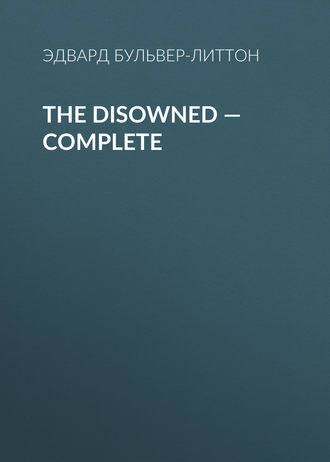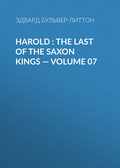
Эдвард Бульвер-Литтон
The Disowned — Complete
Are you fond of poetry, Eleanor? I used to say so, but I never felt that I was till lately. I will show you my favourite passages in my favourite poets when you come to see me. You shall see if yours correspond with mine. I am so impatient to leave this horrid town, where everything seems dull, yet feverish,—insipid, yet false. Shall we not be happy when we meet? If your dear aunt will come with you, she shall see how I (that is my mind) am improved.
Farewell. Ever your most affectionate,F. A.
CHAPTER XLVII
Brave Talbot, we will follow thee.—Henry the Sixth.
“My letter insultingly returned—myself refused admittance; not a single inquiry made during my illness; indifference joined to positive contempt. By Heaven, it is insupportable!”
“My dear Clarence,” said Talbot to his young friend, who, fretful from pain and writhing beneath his mortification, walked to and fro his chamber with an impatient stride; “my dear Clarence, do sit down, and not irritate your wound by such violent exercise. I am as much enraged as yourself at the treatment you have received, and no less at a loss to account for it. Your duel, however unfortunate the event, must have done you credit, and obtained you a reputation both for generosity and spirit; so that it cannot be to that occurrence that you are to attribute the change. Let us rather suppose that Lady Flora’s attachment to you has become evident to her father and mother; that they naturally think it would be very undesirable to marry their daughter to a man whose family nobody knows, and whose respectability he is forced into fighting in order to support. Suffer me then to call upon Lady Westborough, whom I knew many years ago, and explain your origin, as well as your relationship to me.”
Linden paused irresolutely.
“Were I sure that Lady Flora was not utterly influenced by her mother’s worldly views, I would gladly consent to your proposal, but—”
“Forgive me, Clarence,” cried Talbot; “but you really argue much more like a very young man than I ever heard you do before,—even four years ago. To be sure Lady Flora is influenced by her mother’s views. Would you have her otherwise? Would you have her, in defiance of all propriety, modesty, obedience to her parents, and right feeling for herself, encourage an attachment to a person not only unknown, but who does not even condescend to throw off the incognito to the woman he addresses? Come, Clarence, give me your instructions, and let me act as your ambassador to-morrow.”
Clarence was silent.
“I may consider it settled then,” replied Talbot: “meanwhile you shall come home and stay with me; the pure air of the country, even so near town, will do you more good than all the doctors in London; and, besides, you will thus be enabled to escape from that persecuting Frenchwoman.”
“In what manner?” said Clarence.
“Why, when you are in my house, she cannot well take up her abode with you; and you shall, while I am forwarding your suit with Lady Flora, write a very flattering, very grateful letter of excuses to Madame la Meronville. But leave me alone to draw it up for you: meanwhile, let Harrison pack up your clothes and medicines; and we will effect our escape while Madame la Meronville yet sleeps.”
Clarence rang the bell; the orders were given, executed, and in less than an hour he and his friends were on their road to Talbot’s villa.
As they drove slowly through the grounds to the house, Clarence was sensibly struck with the quiet and stillness which breathed around. On either side of the road the honeysuckle and rose cast their sweet scents to the summer wind, which, though it was scarcely noon, stirred freshly among the trees, and waved as if it breathed a second youth over the wan cheek of the convalescent. The old servant’s ear had caught the sound of wheels, and he came to the door, with an expression of quiet delight on his dry countenance, to welcome in his master. They had lived together for so many years that they were grown like one another. Indeed, the veteran valet prided himself on his happy adoption of his master’s dress and manner. A proud man, we ween, was that domestic, whenever he had time and listeners for the indulgence of his honest loquacity; many an ancient tale of his master’s former glories was then poured from his unburdening remembrance. With what a glow, with what a racy enjoyment, did he expand upon the triumphs of the past; how eloquently did he particularize the exact grace with which young Mr. Talbot was wont to enter the room, in which he instantly became the cynosure of ladies’ eyes; how faithfully did he minute the courtly dress, the exquisite choice of colour, the costly splendour of material, which were the envy of gentles, and the despairing wonder of their valets; and then the zest with which the good old man would cry, “I dressed the boy!” Even still, this modern Scipio (Le Sage’s Scipio, not Rome’s) would not believe that his master’s sun was utterly set: he was only in a temporary retirement, and would, one day or other, reappear and reastonish the London world. “I would give my right arm,” Jasper was wont to say, “to see Master at court. How fond the King would be of him! Ah! well, well; I wish he was not so melancholy-like with his books, but would go out like other people!”
Poor Jasper! Time is, in general, a harsh wizard in his transformations; but the change which thou didst lament so bitterly was happier for thy master than all his former “palmy state” of admiration and homage. “Nous avons recherche le plaisir,” says Rousseau, in one of his own inimitable antitheses, “et le bonheur a fui loin de nous.” [“We have pursued pleasure, and happiness has fled far from our reach.”] But in the pursuit of Pleasure we sometimes chance on Wisdom, and Wisdom leads us to the right track, which, if it take us not so far as Happiness, is sure at least of the shelter of Content.
Talbot leaned kindly upon Jasper’s arm as he descended from the carriage, and inquired into his servant’s rheumatism with the anxiety of a friend. The old housekeeper, waiting in the hall, next received his attention; and in entering the drawing-room, with that consideration, even to animals, which his worldly benevolence had taught him, he paused to notice and caress a large gray cat which rubbed herself against his legs. Doubtless there is some pleasure in making even a gray cat happy!
Clarence having patiently undergone all the shrugs, and sighs, and exclamations of compassion at his reduced and wan appearance, which are the especial prerogatives of ancient domestics, followed the old man into the room. Papers and books, though carefully dusted, were left scrupulously in the places in which Talbot had last deposited them (incomparable good fortune! what would we not give for such chamber handmaidens!); fresh flowers were in all the stands and vases; the large library chair was jealously set in its accustomed place, and all wore, to Talbot’s eyes, that cheerful yet sober look of welcome and familiarity which makes a friend of our house. The old man was in high spirits.
“I know not how it is,” said he, “but I feel younger than ever! You have often expressed a wish to see my family seat at Scarsdale: it is certainly a great distance hence; but as you will be my travelling companion, I think I will try and crawl there before the summer is over; or, what say you, Clarence, shall I lend it to you and Lady Flora for the honeymoon? You blush! A diplomatist blush! Ah, how the world has changed since my time! But come, Clarence, suppose you write to La Meronville?”
“Not to-day, sir, if you please,” said Linden: “I feel so very weak.”
“As you please, Clarence; but some years hence you will learn the value of the present. Youth is always a procrastinator, and, consequently, always a penitent.” And thus Talbot ran on into a strain of conversation, half serious, half gay, which lasted till Clarence went upstairs to lie down and muse on Lady Flora Ardenne.
CHAPTER XLVIII
La vie eat un sommeil. Les vieillards sont ceux donc le sommeil a ete plus long: ils ne commencent a se reveiller que quand il faut mourir. —LA BRUYERE.
[“Life is a sleep. The aged are those whose sleep has been the longest they begin to awaken themselves just as they are obliged to die.”]
“You wonder why I have never turned author, with my constant love of literature and my former desire of fame,” said Talbot, as he and Clarence sat alone after dinner, discussing many things: “the fact is, that I have often intended it, and as often been frightened from my design. Those terrible feuds; those vehement disputes; those recriminations of abuse, so inseparable from literary life,—appear to me too dreadful for a man not utterly hardened or malevolent voluntarily to encounter. Good Heavens! what acerbity sours the blood of an author! The manifestoes of opposing generals, advancing to pillage, to burn, to destroy, contain not a tithe of the ferocity which animates the pages of literary controversialists! No term of reproach is too severe, no vituperation too excessive! the blackest passions, the bitterest, the meanest malice, pour caustic and poison upon every page! It seems as if the greatest talents, the most elaborate knowledge, only sprang from the weakest and worst-regulated mind, as exotics from dung. The private records, the public works of men of letters, teem with an immitigable fury! Their histories might all be reduced into these sentences: they were born; they quarrelled; they died!”
“But,” said Clarence, “it would matter little to the world if these quarrels were confined merely to poets and men of imaginative literature, in whom irritability is perhaps almost necessarily allied to the keen and quick susceptibilities which constitute their genius. These are more to be lamented and wondered at among philosophers, theologians, and men of science; the coolness, the patience, the benevolence, which ought to characterize their works, should at least moderate their jealousy and soften their disputes.”
“Ah!” said Talbot, “but the vanity of discovery is no less acute than that of creation: the self-love of a philosopher is no less self-love than that of a poet. Besides, those sects the most sure of their opinions, whether in religion or science, are always the most bigoted and persecuting. Moreover, nearly all men deceive themselves in disputes, and imagine that they are intolerant, not through private jealousy, but public benevolence: they never declaim against the injustice done to themselves; no, it is the terrible injury done to society which grieves and inflames them. It is not the bitter expressions against their dogmas which give them pain; by no means: it is the atrocious doctrines (so prejudicial to the country, if in polities; so pernicious to the world, if in philosophy), which their duty, not their vanity, induces them to denounce and anathematize.”
“There seems,” said Clarence, “to be a sort of reaction in sophistry and hypocrisy: there has, perhaps, never been a deceiver who was not, by his own passions, himself the deceived.”
“Very true,” said Talbot; “and it is a pity that historians have not kept that fact in view: we should then have had a better notion of the Cromwells and Mohammeds of the past than we have now, nor judged those as utter impostors who were probably half dupes. But to return to myself. I think you will already be able to answer your own question, why I did not turn author, now that we have given a momentary consideration to the penalties consequent on such a profession. But in truth, as I near the close of my life, I often regret that I had not more courage, for there is in us all a certain restlessness in the persuasion, whether true or false, of superior knowledge or intellect, and this urges us on to the proof; or, if we resist its impulse; renders us discontented with our idleness and disappointed with the past. I have everything now in my possession which it has been the desire of my later years to enjoy: health, retirement, successful study, and the affection of one in whose breast, when I am gone, my memory will not utterly pass away. With these advantages, added to the gifts of fortune, and an habitual elasticity of spirit, I confess that my happiness is not free from a biting and frequent regret: I would fain have been a better citizen; I would fain have died in the consciousness not only that I had improved my mind to the utmost, but that I had turned that improvement to the benefit of my fellow-creatures. As it is, in living wholly for myself, I feel that my philosophy has wanted generosity; and my indifference to glory has proceeded from a weakness, not, as I once persuaded myself, from a virtue but the fruitlessness of my existence has been the consequence of the arduous frivolities and the petty objects in which my early years were consumed; and my mind, in losing the enjoyments which it formerly possessed, had no longer the vigour to create for itself a new soil, from which labour it could only hope for more valuable fruits. It is no contradiction to see those who most eagerly courted society in their youth shrink from it the most sensitively in their age; for they who possess certain advantages, and are morbidly vain of them, will naturally be disposed to seek that sphere for which those advantages are best calculated: and when youth and its concomitants depart, the vanity so long fed still remains, and perpetually mortifies them by recalling not so much the qualities they have lost, as the esteem which those qualities conferred; and by contrasting not so much their own present alteration, as the change they experience in the respect and consideration of others. What wonder, then, that they eagerly fly from the world, which has only mortification for their self-love, or that we find, in biography, how often the most assiduous votaries of pleasure have become the most rigid of recluses? For my part, I think that that love of solitude which the ancients so eminently possessed, and which, to this day, is considered by some as the sign of a great mind, nearly always arises from a tenderness of vanity, easily wounded in the commerce of the rough world; and that it is under the shadow of Disappointment that we must look for the hermitage. Diderot did well, even at the risk of offending Rousseau, to write against solitude. The more a moralist binds man to man, and forbids us to divorce our interests from our kind, the more effectually is the end of morality obtained. They only are justifiable in seclusion who, like the Greek philosophers, make that very seclusion the means of serving and enlightening their race; who from their retreats send forth their oracles of wisdom, and render the desert which surrounds them eloquent with the voice of truth. But remember, Clarence (and let my life, useless in itself, have at least this moral), that for him who in no wise cultivates his talent for the benefit of others; who is contented with being a good hermit at the expense of being a bad citizen; who looks from his retreat upon a life wasted in the difficiles nugae of the most frivolous part of the world, nor redeems in the closet the time he has misspent in the saloon,—remember that for him seclusion loses its dignity, philosophy its comfort, benevolence its hope, and even religion its balm. Knowledge unemployed may preserve us from vice; but knowledge beneficently employed is virtue. Perfect happiness, in our present state, is impossible; for Hobbes says justly that our nature is inseparable from desires, and that the very word desire (the craving for something not possessed) implies that our present felicity is not complete. But there is one way of attaining what we may term, if not utter, at least mortal, happiness; it is this,—a sincere and unrelaxing activity for the happiness of others. In that one maxim is concentrated whatever is noble in morality, sublime in religion, or unanswerable in truth. In that pursuit we have all scope for whatever is excellent in our hearts, and none for the petty passions which our nature is heir to. Thus engaged, whatever be our errors, there will be nobility, not weakness, in our remorse; whatever our failure, virtue, not selfishness, in our regret; and, in success, vanity itself will become holy and triumph eternal. As astrologers were wont to receive upon metals ‘the benign aspect of the stars, so as to detain and fix, as it were, the felicity of that hour which would otherwise be volatile and fugitive,’ [Bacon] even so will that success leave imprinted upon our memory a blessing which cannot pass away; preserve forever upon our names, as on a signet, the hallowed influence of the hour in which our great end was effected, and treasure up ‘the relics of heaven’ in the sanctuary of a human fane.”
As the old man ceased, there was a faint and hectic flush over his face, an enthusiasm on his features, which age made almost holy, and which Clarence had never observed there before. In truth, his young listener was deeply affected, and the advice of his adopted parent was afterwards impressed with a more awful solemnity upon his remembrance. Already he had acquired much worldly lore from Talbot’s precepts and conversation. He had obtained even something better than worldly lore,—a kindly and indulgent disposition to his fellow-creatures; for he had seen that foibles were not inconsistent with generous and great qualities, and that we judge wrongly of human nature when we ridicule its littleness. The very circumstances which make the shallow misanthropical incline the wise to be benevolent. Fools discover that frailty is not incompatible with great men; they wonder and despise: but the discerning find that greatness is not incompatible with frailty; and they admire and indulge.
But a still greater benefit than this of toleration did Clarence derive from the commune of that night. He became strengthened in his honourable ambition and nerved to unrelaxing exertion. The recollection of Talbot’s last words, on that night, occurred to him often and often, when sick at heart and languid with baffled hope, it roused him from that gloom and despondency which are always unfavourable to virtue, and incited him once more to that labour in the vineyard which, whether our hour be late or early, will if earnest obtain a blessing and reward.
The hour was now waxing late; and Talbot, mindful of his companion’s health, rose to retire. As he pressed Clarence’s hand and bade him farewell for the night, Linden thought there was something more than usually impressive in his manner and affectionate in his words. Perhaps this was the natural result of their conversation.
The next morning, Clarence was awakened by a noise. He listened, and heard distinctly an alarmed cry proceeding from the room in which Talbot slept, and which was opposite to his own. He rose hastily and hurried to the chamber. The door was open; the old servant was bending over the bed: Clarence approached, and saw that he supported his master in his arms.
“Good God!” he cried, “what is the matter?” The faithful old man lifted up his face to Clarence, and the big tears rolled fast from eyes in which the sources of such emotion were well-nigh dried up.
“He loved you well, sir!” he said, and could say no more. He dropped the body gently, and throwing himself on the floor sobbed aloud. With a foreboding and chilled heart, Clarence bent forward; the face of his benefactor lay directly before him, and the hand of death was upon it. The soul had passed to its account hours since, in the hush of night,—passed, apparently, without a struggle or a pang, like the wind, which animates the harp one moment, and the next is gone.
Linden seized his hand; it was heavy and cold: his eye rested upon the miniature of the unfortunate Lady Merton, which, since the night of the attempted robbery, Talbot had worn constantly round his neck. Strange and powerful was the contrast of the pictured face—in which not a colour had yet faded, and where the hues and fulness and prime of youth dwelt, unconscious of the lapse of years—with the aged and shrunken countenance of the deceased.
In that contrast was a sad and mighty moral: it wrought, as it were, a contract between youth and age, and conveyed a rapid but full history of our passions and our life.
The servant looked up once more on the countenance; he pointed towards it, and muttered, “See, see how awfully it is changed!”
“But there is a smile upon it!” said Clarence, as he flung himself beside the body and burst into tears.







